These fashionistas aren’t just talking the talk, they’re walking the catwalk. See who’s shining a spotlight on clothing with a conscience, then join our comment thread below.

Tierra Del Forte
Just call her Ms. Green Jeans. This designer and founder of Del Forte Denim has created a line of premium organic denim for women. And when your favorite pair has seen its last days, send it back to her for Project Rejeaneration reuse and renewal.
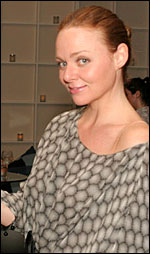
WireImage.com
Stella McCartney
A strict vegetarian, McCartney (daughter of Sir Paul and Linda) is an avid supporter of PETA and refuses to use fur or leather in her designs. Earlier this year, she unveiled a skincare line containing 100 percent organic active ingredients.

Summer Rayne Oakes
A self-described “eco-style expert,” Oakes is a Cornell-educated scientist who now focuses on modeling — but only clothing made from organic or recycled materials. A frequent spokesperson for eco-fashion, Oakes also publishes S4, a newsletter reporting on sustainability trends in the industry.
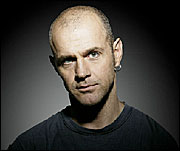
Gary Harvey
After spending almost 10 years as creative director at Levi Strauss, it’s only natural that the first piece in Harvey’s own collection would be made from jeans — 42 pairs, actually, refashioned into a couture dress. Showing his collection during London Fashion Week this year, Harvey gave new life to recycled newspapers, secondhand baseball jackets, and even used wedding gowns.
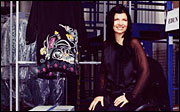
Ali Hewson
A longtime activist — most notably for children and communities affected by the 1986 Chernobyl disaster — Hewson had social consciousness in mind when she launched clothing line Edun with her husband Bono and designer Rogan Gregory. Edun pieces are made with organic materials and fair-labor practices in developing areas of the world, in an effort to increase trade and create sustainable employment.

Linda Loudermilk
Designing for celebs like Debra Messing and Jane Fonda, Loudermilk creates high-fashion pieces from a variety of textiles, including bamboo, reclaimed antique lace, soy, and wood pulp. She also has special products benefiting stopglobalwarming.org and the Global Campaign for the Right to Water, and developed the Luxury Eco accreditation stamp to recognize products and services that are high quality and ecologically sound.

Katharine Hamnett
Best known for her T-shirts with slogans like “CHOOSE LIFE” and “FRANKIE SAY RELAX” printed in large block letters, Hamnett isn’t afraid of making a statement. For years, she campaigned to get her licensees to convert to ethical and ecologically conscious practices, and when they wouldn’t, she decided in 2005 to completely relaunch her line using certified ethical and eco-conscious suppliers. She’s currently working on a “Clean Up or Die” campaign to green the cotton industry.

Bahar Shahpar
Brooklynite Shahpar says she’s “concerned about the environment, but [she’s] not a Birkenstock person.” That’s why she’s created a fashion-forward collection made entirely from ecologically sound materials like organic wool, linen, and even a special silk harvested from discarded cocoons.

Marci Zaroff
In founding organic clothing company Under the Canopy in 1996, Zaroff coined and trademarked the term “ECOfashion.” And she’s certainly put her own stamp on the natural products industry with organic and organic-blend pieces ranging from men’s and women’s wear to bed and bath linens.

Lynda Grose
This eco-fashion pioneer helped put together Esprit’s Ecollection in the early ’90s — the first complete green clothing line distributed by a major corporation. Though the Ecollection was discontinued, Grose now works with the Sustainable Cotton Project, helping to educate manufacturers about organic and sustainable options, and teaches a popular eco-fashion course at the California College of the Arts.

Jodi Koskella.
Courtesy of John Dolan
Photography
Lauren Carroll and Jodi Koskella
These co-owners of Charmoné Shoes create cruelty-free footwear for fashion-conscious women. Made animal-free and sweatshop-free, these pumps and platforms are the foot accessory of choice for eco-minded celebs like Natalie Portman.

Rogan Gregory
The designer behind Ali Hewson’s Edun and his own line of furniture incorporating recycled industrial materials, Gregory would seem to have plenty on his (sustainably made) plate. But he’s also co-founder of Loomstate, an organic clothing company making jeans for men and women.
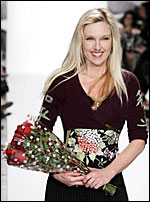
Deborah Lindquist
Her designs have been spotted on celebs like Gwen Stefani, Paris Hilton, Charlize Theron, and even the Pussycat Dolls. But Lindquist remains just as committed to environmental responsibility as trendsetting style. In addition to using sustainable materials like hemp and organic wool, she incorporates recycled cashmere, vintage silk, and repurposed kimonos.

Karen Stewart and Howard Brown
Partners in life and work, this duo produces their casual clothing line Stewart + Brown using eco-friendly materials, including cashmere culled by Mongolian nomads as part of a self-sustaining co-op. They also donate 1 percent of all their sales to environmental organizations through 1% for the Planet.

Sarah Ratty
Her green fashion career started more than a decade ago when she began rescuing cable-knit sweaters from Oxfam shops to reuse in completely different creations — like a knitwear coat that is now in the permanent collection of the Victoria and Albert Museum. Since then, she’s woven her interest in recycling post-consumer waste into a streetwear line called Conscious Earthwear, and, more recently, the luxury line Ciel, which attracts A-listers like Sienna Miller and Cate Blanchett.
A New Hue for Fashion Week
Some of the world’s fashion hubs are cozying up to green at their annual expos. Here are a few ways they’re strutting their stuff.
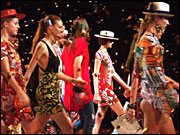
São Paulo
This year’s summer fashion week featured an ecological theme, with designers wrapping green into their work. Organizers highlighted water conservation, recycling, and alternative energy, and planned to plant 7,800 trees to offset carbon emissions. Which, in the Southern Hemisphere, actually means something. The event followed hot on the heels of a sustainability-themed January fashion week that included an exhibit of garments made from recycled plastic, waste paper, and other eco-fabrics.
Los Angeles
Organizers of the semiannual L.A. Fashion Week announced in late June that their October show will focus on “sustainability and eco-friendly fashions and designers.” While details are still being ironed out, the show is also looking for ways to reduce its impact, “from production to the runway,” says one source. Major sponsor Mercedes-Benz, which will use the opportunity to hype its clean-diesel technology, characterized the shift as a good way to move eco-discussions forward.
New York
In February, New York Fashion Week included a three-day trade show that donated a portion of its proceeds to Al Gore’s Climate Project. Participating “designers for a cause” included Diane von Furstenberg, Diesel, Marc Jacobs, and others. And waaaay back at a 2005 Fashion Week, a show called FutureFashion highlighted bamboo, organic cotton, and other eco-friendly materials.
London
For the last year, part of London Fashion Week has been dedicated to “refashioning the industry” through a platform called Estethica. Devoted to using organic, fair-trade, and recycled materials, the international designers displaying their wares at Estethica produce everything from organic lingerie to men’s clothing made from recycled suits. A guide to ethical fashion published in collaboration with The Ecologist helps attendees navigate the issues — and the garb.
Have measured feelings about who made the cut? Slip us your own suggestions below.
Sarah van Schagen contributed to this list.


